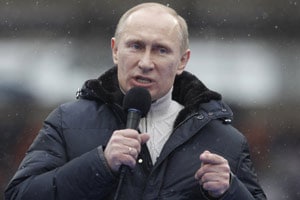Vladimir Putin’s economic plan: ‘great leap’ into the unknown
Putin is acutely aware that a major eurozone crisis would severely wound Russian exporters.

Newly-inaugurated President Vladimir Putin has set hugely ambitious targets to catapult the Russian economy into the modern era but their realism remains in doubt despite a benign short-term outlook.
Russia is looking with a degree of superiority on the crisis engulfing the debt-ridden eurozone states,predicting only a narrow budget deficit of just 0.3 per cent of GDP this year and buoyed by robust first quarter growth.
monthly limit of free stories.
with an Express account.
But Putin is also acutely aware that a major eurozone crisis would severely wound Russian exporters and limit its receipts of petro-dollars.
Moreover,the country’s economy has yet to fully modernize 20 years after the collapse of the Soviet Union and its vulnerability to external shocks is an acute worry for Putin as he faces the first serious street protests against his rule.
Russian Deputy Prime Minister Igor Shuvalov,pointman on the economy in the outgoing government,this week gave an unusually frank assessment of Russia’s failings,admitting “we cannot say now that Russia is a modern country”.
“We have big social spending,large-scale innovation-based industry is absent,we have underdeveloped institutions and a legal system which needs almost to be created from scratch.”
“We need to bring the economy and the social sphere to modern standards. This is not an empty slogan but the fulfillment of plans on modernization,” he told the Vedomosti business daily.
Hours after taking office on May 7 for his third term as after his four year stint as prime minister,Putin signed a decree on economic policy apparently aimed at ending Russia’s shortcomings once and for all.
The lofty aims sounded familiar but,if implemented,they would have a truly revolutionary impact on the Russian economy and society.
Putin ordered the government to take measures:
— To create and modernise 25 million high-productivity jobs by 2020.
— To increase investment to no less than 25 per cent of GDP by 2015.
— To boost labour productivity to a level one-and-half times greater than that of 2011.
— To lift Russia’s position in the World Bank’s Doing Business Index from 120 in 2011 to 50 in 2015 and 20 in 2018.
— To raise average life expectancy by 2018 to 74 years from the current 70.
Russia’s current ranking on the ease of Doing Business index places it nine places below Ethiopia and two places above Bangladesh.
The goals are spectacularly ambitious,particularly as they are supposed to be released within the period of his six year presidential term.